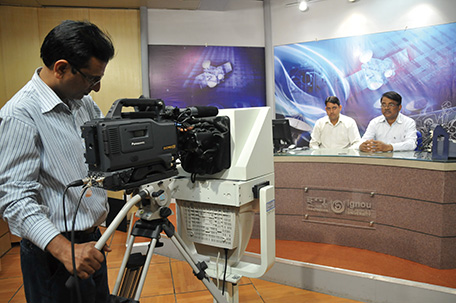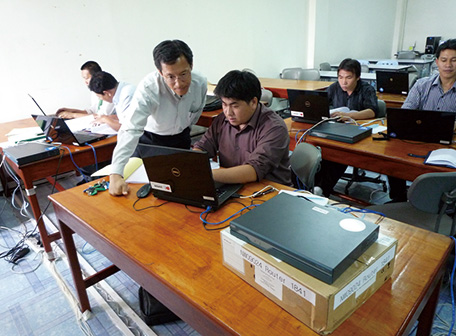Japan's Official Development Assistance White Paper 2012
(2) Information and Communication Technology (ICT)
The dissemination of Information and Communication Technology (ICT)* contributes to the achievement of sustainable economic growth by upgrading industries and improving productivity. It also contributes to addressing the issues related to medical care, education, energy, the environment, disaster management, and other societal issues. Utilization of ICT improves their democratic foundation through encouraging information disclosure by the government, and improving the environment for broadcasting media. It is also extremely important to strengthen the civil society through improvement of the convenience and quality of services.
<Japan's Efforts>
Japan has actively offered assistance focusing on the field of the construction of communication and broadcasting facilities in developing countries, as well as the installation of the technology and systems they require and relevant human resources development, in efforts to improve the lives of all people and to eliminate the ICT disparities that exist between countries and regions.
Specifically, Japan has worked with ITU (International Telecommunication Union)*, a specialized agency of the United Nations responsible for telecommunications, to provide a variety of telecommunications development assistance to developing countries. In March 2012 in Sendai, the Ministry of Internal Affairs and Communications (MIC) and the ITU held a joint Symposium on Disaster Communications to share with overseas organizations the knowledge and lessons Japan had learned in the ICT field from the Great East Japan Earthquake and the resulting reconstruction process. Japan has also decided to hold workshops and other activities in 2013 under the aim of spreading ICT e-health to developing countries in order to help solve medical problems common throughout the world.
In the Asia-Pacific Ocean region, the Asian international organization Asia Pacific Telecommunity(APT)* has served as a coordinator of regional policy. In 2009, APT formulated joint declarations and action plans intended to set the stage for collaborative efforts among member countries that would work to proliferate broadband in the Asia-Pacific Ocean region. Their efforts have contributed to a balanced development of telecommunications and information bases within the region. To reduce ICT disparities and solve on-site health and education problems with ICT, Japan has supported a pilot project and human resource development such as trainings and workshops through APT.
In ASEAN, the joint declaration (Bali Declaration) adopted at the Japan-ASEAN Summit Meeting held in November 2011 incorporated the ASEAN Smart Network Initiative and other cooperative enhancements in the field of ICT as part of an effort to advance cooperation in the field of telecommunications.
Furthermore, the problems surrounding cyber attacks have piqued the interest of ASEAN countries in recent years. In a joint declaration at the Japan-ASEAN Telecommunications and IT Ministers Meeting (TELMIN) held in the Philippines (Cebu) in November 2012, an agreement was reached to hold the Japan-ASEAN Ministerial Policy Meeting on Cyber Security Cooperation in Japan (Tokyo) in September 2013.
Though also linked to the country's economic growth, Japan actively provides comprehensive support to overseas promoting activities for Integrated Services Digital Broadcasting-Terrestrial (ISDB-T)* in terms of maintenance, personnel, and systems. As of January 2013, ISDB-T has been spread throughout Latin America. Japan has dispatched experts to eight countries including Chile, Peru and Costa Rica and been transferring technologies since FY 2009 as part of the support to ISDB-T adopter countries. Furthermore, JICA training is conducted every year for both adopter countries and potential adopter countries to promote the overseas spread and introduction of ISDB-T.

Most of the broadcasting equipment in the educational materials production center of this Indian university was provided by Japan. (Photo: Osamu Funao/JICA)
- *Information and Communication Technology (ICT)
- ICT is technology that integrates computers and other information technology with digital communication technology, as characterized by the Internet and mobile phones.
- *International Telecommunication Union (ITU)
- This UN specialized agency is responsible for the fields of telecommunications and broadcasting (HQ: Geneva, Switzerland. 193 member countries). To ensure that people around the world are able to make use of telecommunications technologies, this agency provides support for: (1) the international allocation of radio frequencies used in mobile phones, satellite broadcasting, and other technologies, (2) the international standardization of technologies for telephone and the Internet, etc., (3) telecommunications development in developing countries.
- *Asia-Pacific Telecommunity (APT)
- An international telecommunications organization established in the Asia-Pacific Ocean region in 1979, made up of 38 member countries. Aiming for a balanced development of telecommunications and information bases in the Asia-Pacific Ocean region, it develops human resources through training sessions and seminars and coordinates regional policies on standardization, wireless communication, and other telecommunication issues.
- *Integrated Services Digital Broadcasting - Terrestrial (ISDB-T)
- A terrestrial digital broadcasting system that was developed in Japan. Its advantages include emergency alert broadcasts and other features useful in disaster prevention.
●Laos
Human Resource Development in IT Service Industry at NUOL
Technical Cooperation Project (December 2008 - Present)
Laos lags behind its neighbors in terms of the introduction and development of IT. In response, the government has been emphasizing the importance of IT education since 2001 in an attempt to use its introduction to stimulate the whole of the national economy.
Under these circumstances, Japan dispatched experts, trained university faculty and provided the needed equipment and educational facilities to the IT Department of the Faculty of Engineering, National University of Laos (NUOL) to support human resource development in the area of IT. With support from Japan, NUOL has established specialist courses and IT Business Unit (ITBU)* within the university's IT department, allowing students in Laos to acquire practical software engineering techniques and business skills. About 30 students enter this course every year, and in 2011, the very first class of 38 students finally graduated. The hope is that these students will use IT technology to support future development in Laos.
(As of December 2012)
* IT Business Unit (ITBU): The ITBU is established within universities to provide a forum for industry-academic collaboration. First it accepts orders for system development and private IT engineers, university faculty, and students collaborate on developing the system. ITBU allows students to study and learn the techniques in the joint development of large-scale systems at actual sites.

Technology transfer by a Japanese JICA expert (Photo: JICA)
